Analysis of Core Values and Intercultural Management at McDonald's
VerifiedAdded on 2021/02/22
|11
|3493
|303
Report
AI Summary
This report provides a comprehensive analysis of McDonald's intercultural management strategies, focusing on its operations in the UK and India. The report begins by establishing a conceptual framework related to cross-cultural management within hospitality, tourism, and event management organizations, highlighting the cultural profiles of both the UK and India, including people-centricity, individual and organizational learning, and the importance of diversity and inclusion. It then delves into strategic thinking in cross-cultural management, emphasizing communication, strong employee relationships, and embracing diversity to foster a harmonious work environment. The evaluation of existing business practices reveals how McDonald's adapts its menu and leadership styles to suit local markets. The report also explores the challenges McDonald's faces in the Indian market, such as adapting to local tastes and customs. The report recommends strategies for McDonald's to enhance its presence in India, including modifying products and marketing strategies. Overall, this report offers valuable insights into the complexities of managing a global brand across diverse cultural landscapes, with a focus on leadership and management practices.
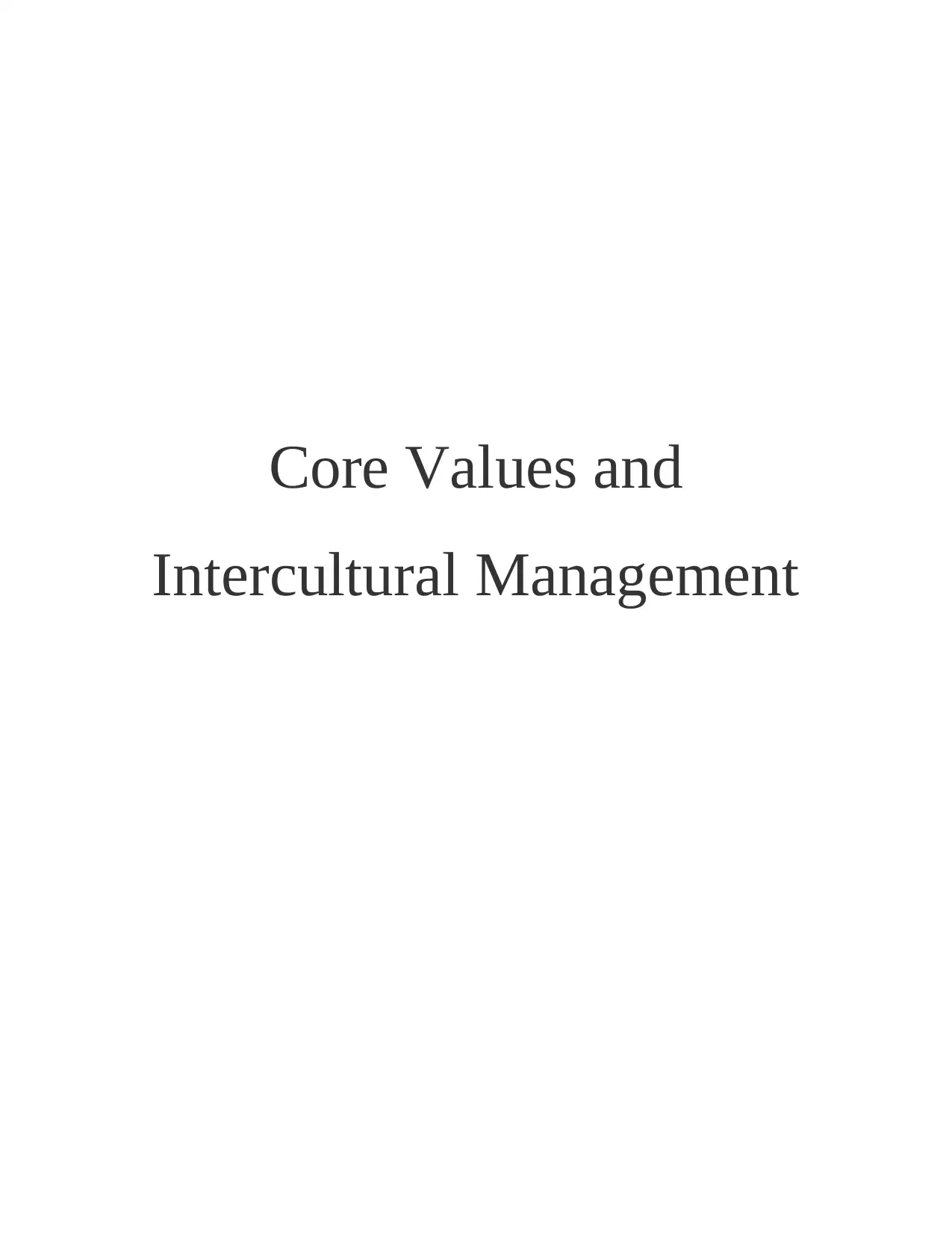
Core Values and
Intercultural Management
Intercultural Management
Paraphrase This Document
Need a fresh take? Get an instant paraphrase of this document with our AI Paraphraser
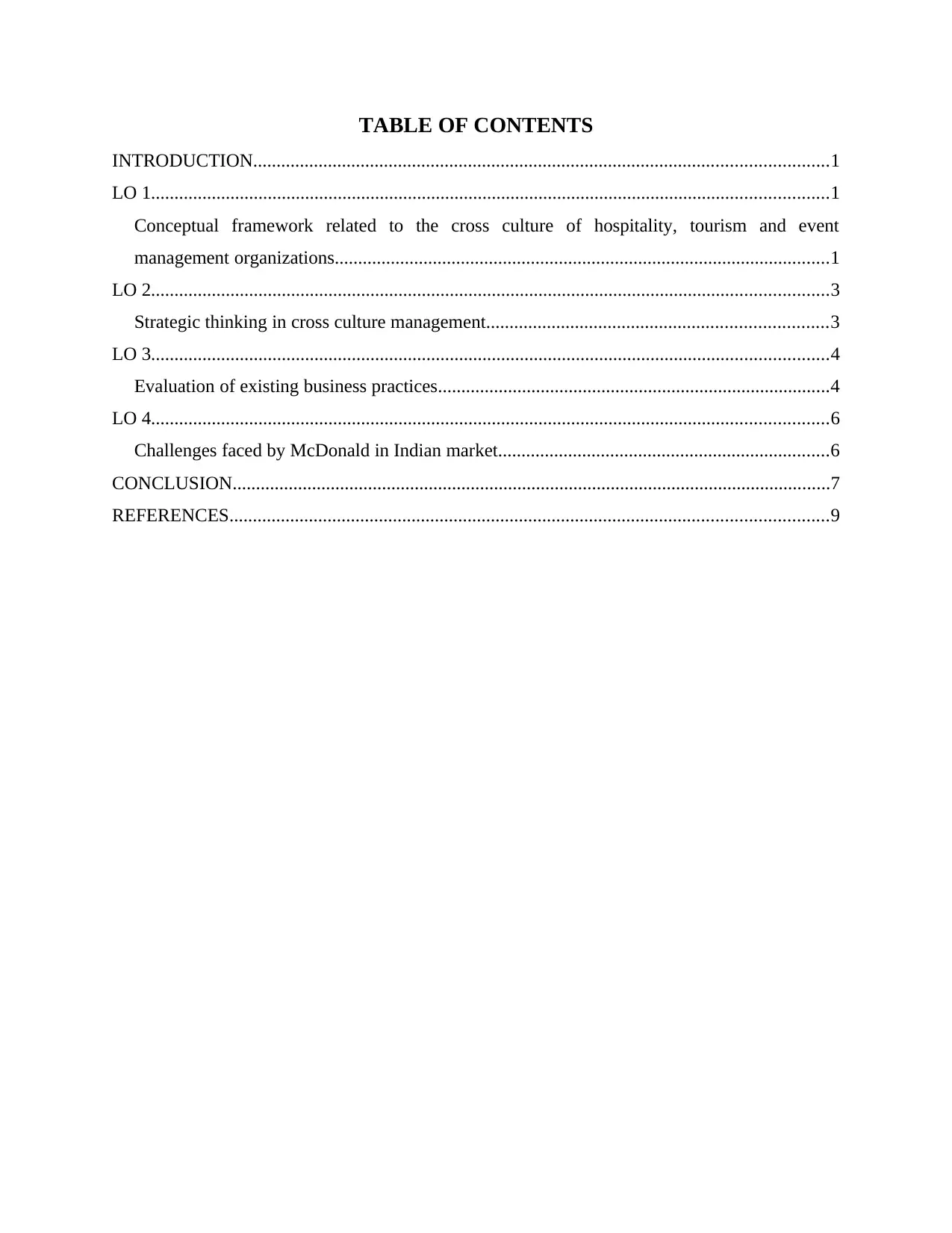
TABLE OF CONTENTS
INTRODUCTION...........................................................................................................................1
LO 1.................................................................................................................................................1
Conceptual framework related to the cross culture of hospitality, tourism and event
management organizations..........................................................................................................1
LO 2.................................................................................................................................................3
Strategic thinking in cross culture management.........................................................................3
LO 3.................................................................................................................................................4
Evaluation of existing business practices....................................................................................4
LO 4.................................................................................................................................................6
Challenges faced by McDonald in Indian market.......................................................................6
CONCLUSION................................................................................................................................7
REFERENCES................................................................................................................................9
INTRODUCTION...........................................................................................................................1
LO 1.................................................................................................................................................1
Conceptual framework related to the cross culture of hospitality, tourism and event
management organizations..........................................................................................................1
LO 2.................................................................................................................................................3
Strategic thinking in cross culture management.........................................................................3
LO 3.................................................................................................................................................4
Evaluation of existing business practices....................................................................................4
LO 4.................................................................................................................................................6
Challenges faced by McDonald in Indian market.......................................................................6
CONCLUSION................................................................................................................................7
REFERENCES................................................................................................................................9
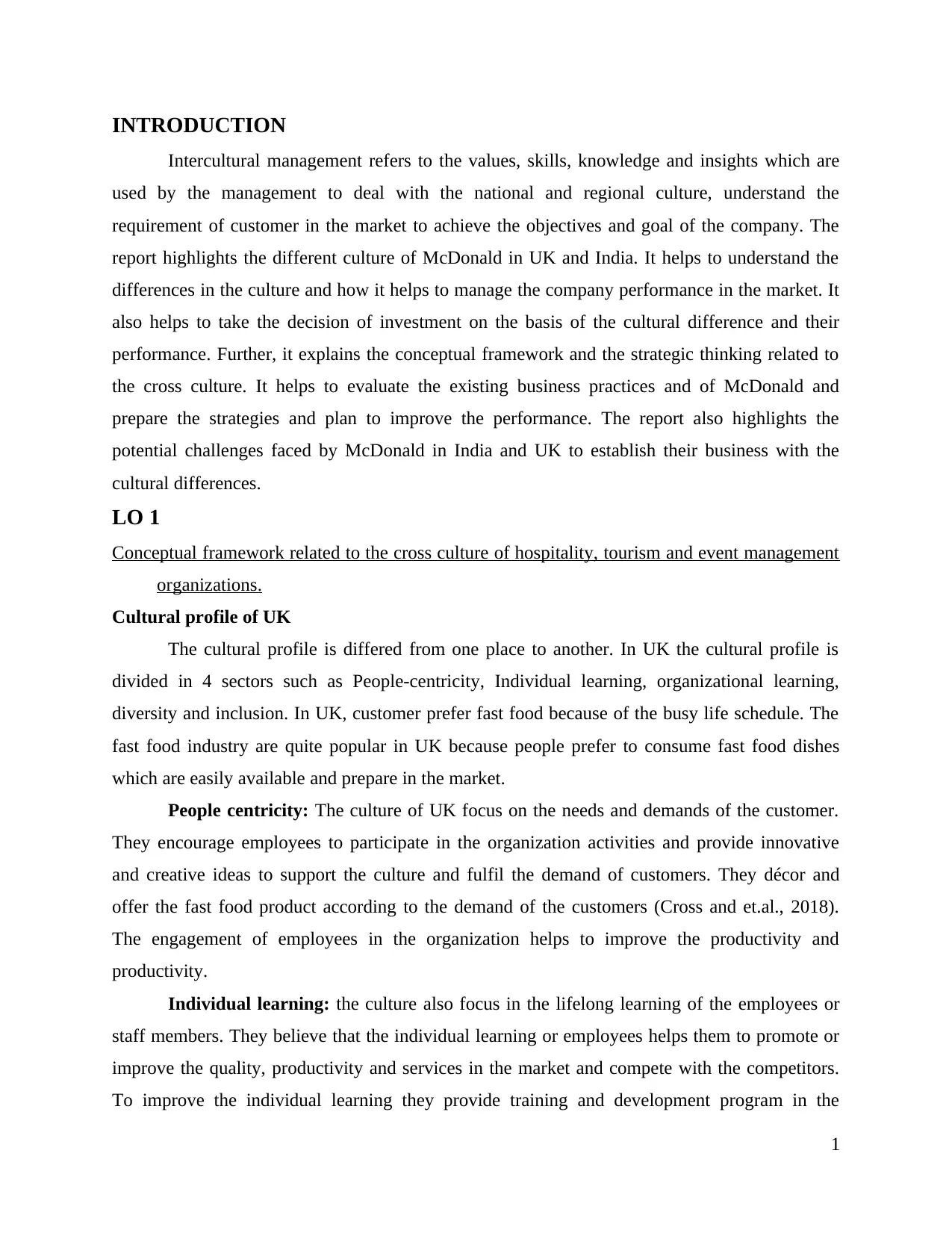
INTRODUCTION
Intercultural management refers to the values, skills, knowledge and insights which are
used by the management to deal with the national and regional culture, understand the
requirement of customer in the market to achieve the objectives and goal of the company. The
report highlights the different culture of McDonald in UK and India. It helps to understand the
differences in the culture and how it helps to manage the company performance in the market. It
also helps to take the decision of investment on the basis of the cultural difference and their
performance. Further, it explains the conceptual framework and the strategic thinking related to
the cross culture. It helps to evaluate the existing business practices and of McDonald and
prepare the strategies and plan to improve the performance. The report also highlights the
potential challenges faced by McDonald in India and UK to establish their business with the
cultural differences.
LO 1
Conceptual framework related to the cross culture of hospitality, tourism and event management
organizations.
Cultural profile of UK
The cultural profile is differed from one place to another. In UK the cultural profile is
divided in 4 sectors such as People-centricity, Individual learning, organizational learning,
diversity and inclusion. In UK, customer prefer fast food because of the busy life schedule. The
fast food industry are quite popular in UK because people prefer to consume fast food dishes
which are easily available and prepare in the market.
People centricity: The culture of UK focus on the needs and demands of the customer.
They encourage employees to participate in the organization activities and provide innovative
and creative ideas to support the culture and fulfil the demand of customers. They décor and
offer the fast food product according to the demand of the customers (Cross and et.al., 2018).
The engagement of employees in the organization helps to improve the productivity and
productivity.
Individual learning: the culture also focus in the lifelong learning of the employees or
staff members. They believe that the individual learning or employees helps them to promote or
improve the quality, productivity and services in the market and compete with the competitors.
To improve the individual learning they provide training and development program in the
1
Intercultural management refers to the values, skills, knowledge and insights which are
used by the management to deal with the national and regional culture, understand the
requirement of customer in the market to achieve the objectives and goal of the company. The
report highlights the different culture of McDonald in UK and India. It helps to understand the
differences in the culture and how it helps to manage the company performance in the market. It
also helps to take the decision of investment on the basis of the cultural difference and their
performance. Further, it explains the conceptual framework and the strategic thinking related to
the cross culture. It helps to evaluate the existing business practices and of McDonald and
prepare the strategies and plan to improve the performance. The report also highlights the
potential challenges faced by McDonald in India and UK to establish their business with the
cultural differences.
LO 1
Conceptual framework related to the cross culture of hospitality, tourism and event management
organizations.
Cultural profile of UK
The cultural profile is differed from one place to another. In UK the cultural profile is
divided in 4 sectors such as People-centricity, Individual learning, organizational learning,
diversity and inclusion. In UK, customer prefer fast food because of the busy life schedule. The
fast food industry are quite popular in UK because people prefer to consume fast food dishes
which are easily available and prepare in the market.
People centricity: The culture of UK focus on the needs and demands of the customer.
They encourage employees to participate in the organization activities and provide innovative
and creative ideas to support the culture and fulfil the demand of customers. They décor and
offer the fast food product according to the demand of the customers (Cross and et.al., 2018).
The engagement of employees in the organization helps to improve the productivity and
productivity.
Individual learning: the culture also focus in the lifelong learning of the employees or
staff members. They believe that the individual learning or employees helps them to promote or
improve the quality, productivity and services in the market and compete with the competitors.
To improve the individual learning they provide training and development program in the
1
⊘ This is a preview!⊘
Do you want full access?
Subscribe today to unlock all pages.

Trusted by 1+ million students worldwide
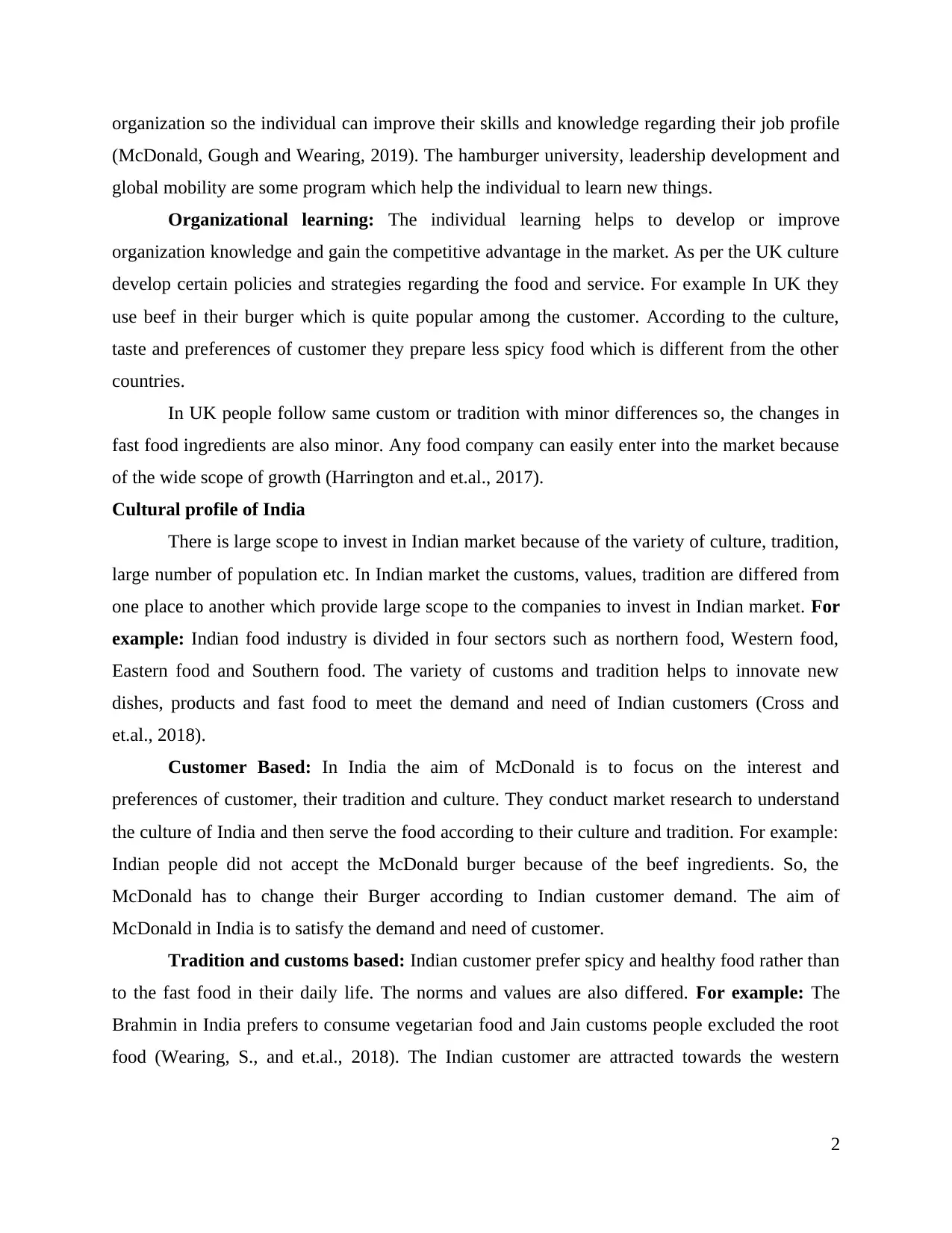
organization so the individual can improve their skills and knowledge regarding their job profile
(McDonald, Gough and Wearing, 2019). The hamburger university, leadership development and
global mobility are some program which help the individual to learn new things.
Organizational learning: The individual learning helps to develop or improve
organization knowledge and gain the competitive advantage in the market. As per the UK culture
develop certain policies and strategies regarding the food and service. For example In UK they
use beef in their burger which is quite popular among the customer. According to the culture,
taste and preferences of customer they prepare less spicy food which is different from the other
countries.
In UK people follow same custom or tradition with minor differences so, the changes in
fast food ingredients are also minor. Any food company can easily enter into the market because
of the wide scope of growth (Harrington and et.al., 2017).
Cultural profile of India
There is large scope to invest in Indian market because of the variety of culture, tradition,
large number of population etc. In Indian market the customs, values, tradition are differed from
one place to another which provide large scope to the companies to invest in Indian market. For
example: Indian food industry is divided in four sectors such as northern food, Western food,
Eastern food and Southern food. The variety of customs and tradition helps to innovate new
dishes, products and fast food to meet the demand and need of Indian customers (Cross and
et.al., 2018).
Customer Based: In India the aim of McDonald is to focus on the interest and
preferences of customer, their tradition and culture. They conduct market research to understand
the culture of India and then serve the food according to their culture and tradition. For example:
Indian people did not accept the McDonald burger because of the beef ingredients. So, the
McDonald has to change their Burger according to Indian customer demand. The aim of
McDonald in India is to satisfy the demand and need of customer.
Tradition and customs based: Indian customer prefer spicy and healthy food rather than
to the fast food in their daily life. The norms and values are also differed. For example: The
Brahmin in India prefers to consume vegetarian food and Jain customs people excluded the root
food (Wearing, S., and et.al., 2018). The Indian customer are attracted towards the western
2
(McDonald, Gough and Wearing, 2019). The hamburger university, leadership development and
global mobility are some program which help the individual to learn new things.
Organizational learning: The individual learning helps to develop or improve
organization knowledge and gain the competitive advantage in the market. As per the UK culture
develop certain policies and strategies regarding the food and service. For example In UK they
use beef in their burger which is quite popular among the customer. According to the culture,
taste and preferences of customer they prepare less spicy food which is different from the other
countries.
In UK people follow same custom or tradition with minor differences so, the changes in
fast food ingredients are also minor. Any food company can easily enter into the market because
of the wide scope of growth (Harrington and et.al., 2017).
Cultural profile of India
There is large scope to invest in Indian market because of the variety of culture, tradition,
large number of population etc. In Indian market the customs, values, tradition are differed from
one place to another which provide large scope to the companies to invest in Indian market. For
example: Indian food industry is divided in four sectors such as northern food, Western food,
Eastern food and Southern food. The variety of customs and tradition helps to innovate new
dishes, products and fast food to meet the demand and need of Indian customers (Cross and
et.al., 2018).
Customer Based: In India the aim of McDonald is to focus on the interest and
preferences of customer, their tradition and culture. They conduct market research to understand
the culture of India and then serve the food according to their culture and tradition. For example:
Indian people did not accept the McDonald burger because of the beef ingredients. So, the
McDonald has to change their Burger according to Indian customer demand. The aim of
McDonald in India is to satisfy the demand and need of customer.
Tradition and customs based: Indian customer prefer spicy and healthy food rather than
to the fast food in their daily life. The norms and values are also differed. For example: The
Brahmin in India prefers to consume vegetarian food and Jain customs people excluded the root
food (Wearing, S., and et.al., 2018). The Indian customer are attracted towards the western
2
Paraphrase This Document
Need a fresh take? Get an instant paraphrase of this document with our AI Paraphraser
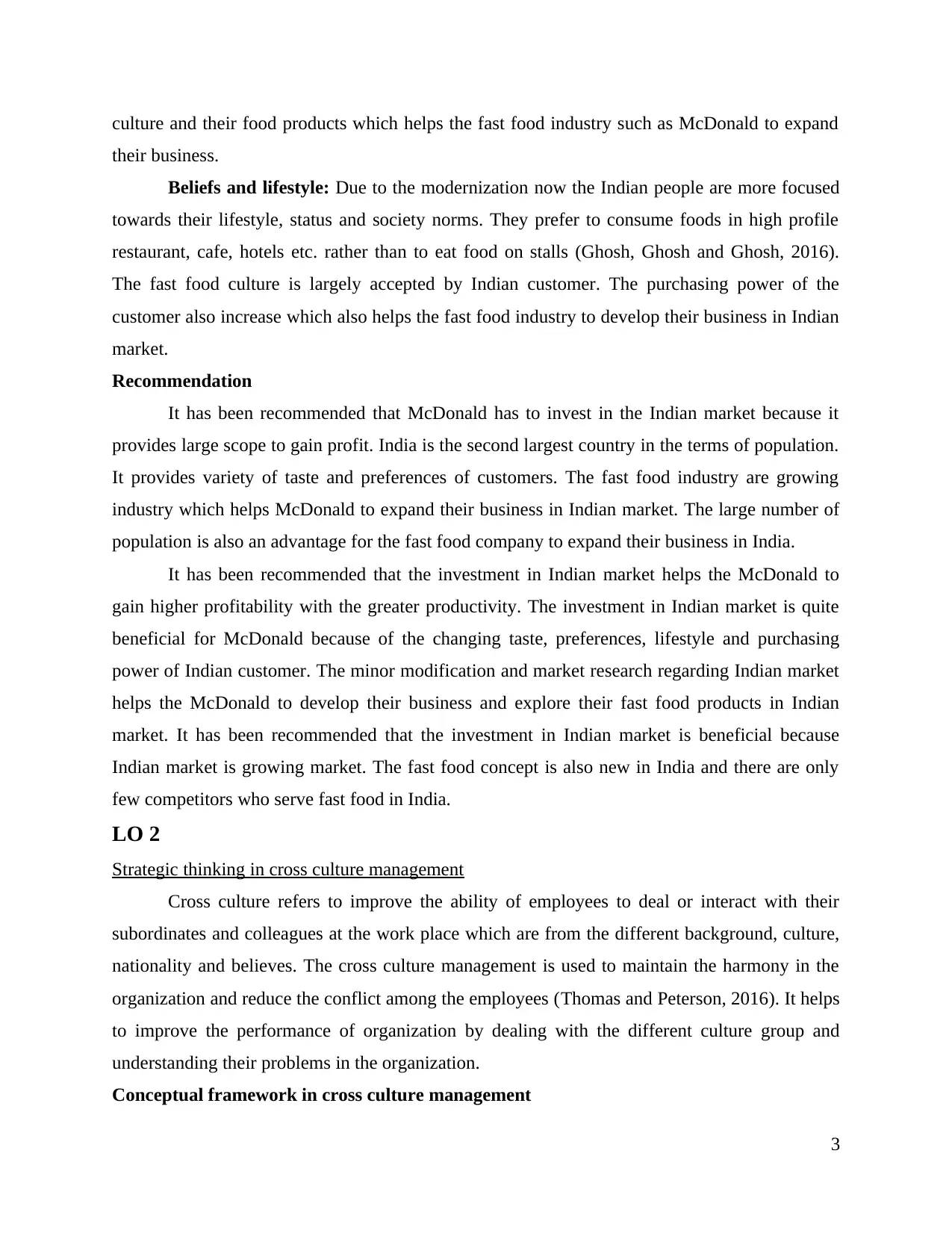
culture and their food products which helps the fast food industry such as McDonald to expand
their business.
Beliefs and lifestyle: Due to the modernization now the Indian people are more focused
towards their lifestyle, status and society norms. They prefer to consume foods in high profile
restaurant, cafe, hotels etc. rather than to eat food on stalls (Ghosh, Ghosh and Ghosh, 2016).
The fast food culture is largely accepted by Indian customer. The purchasing power of the
customer also increase which also helps the fast food industry to develop their business in Indian
market.
Recommendation
It has been recommended that McDonald has to invest in the Indian market because it
provides large scope to gain profit. India is the second largest country in the terms of population.
It provides variety of taste and preferences of customers. The fast food industry are growing
industry which helps McDonald to expand their business in Indian market. The large number of
population is also an advantage for the fast food company to expand their business in India.
It has been recommended that the investment in Indian market helps the McDonald to
gain higher profitability with the greater productivity. The investment in Indian market is quite
beneficial for McDonald because of the changing taste, preferences, lifestyle and purchasing
power of Indian customer. The minor modification and market research regarding Indian market
helps the McDonald to develop their business and explore their fast food products in Indian
market. It has been recommended that the investment in Indian market is beneficial because
Indian market is growing market. The fast food concept is also new in India and there are only
few competitors who serve fast food in India.
LO 2
Strategic thinking in cross culture management
Cross culture refers to improve the ability of employees to deal or interact with their
subordinates and colleagues at the work place which are from the different background, culture,
nationality and believes. The cross culture management is used to maintain the harmony in the
organization and reduce the conflict among the employees (Thomas and Peterson, 2016). It helps
to improve the performance of organization by dealing with the different culture group and
understanding their problems in the organization.
Conceptual framework in cross culture management
3
their business.
Beliefs and lifestyle: Due to the modernization now the Indian people are more focused
towards their lifestyle, status and society norms. They prefer to consume foods in high profile
restaurant, cafe, hotels etc. rather than to eat food on stalls (Ghosh, Ghosh and Ghosh, 2016).
The fast food culture is largely accepted by Indian customer. The purchasing power of the
customer also increase which also helps the fast food industry to develop their business in Indian
market.
Recommendation
It has been recommended that McDonald has to invest in the Indian market because it
provides large scope to gain profit. India is the second largest country in the terms of population.
It provides variety of taste and preferences of customers. The fast food industry are growing
industry which helps McDonald to expand their business in Indian market. The large number of
population is also an advantage for the fast food company to expand their business in India.
It has been recommended that the investment in Indian market helps the McDonald to
gain higher profitability with the greater productivity. The investment in Indian market is quite
beneficial for McDonald because of the changing taste, preferences, lifestyle and purchasing
power of Indian customer. The minor modification and market research regarding Indian market
helps the McDonald to develop their business and explore their fast food products in Indian
market. It has been recommended that the investment in Indian market is beneficial because
Indian market is growing market. The fast food concept is also new in India and there are only
few competitors who serve fast food in India.
LO 2
Strategic thinking in cross culture management
Cross culture refers to improve the ability of employees to deal or interact with their
subordinates and colleagues at the work place which are from the different background, culture,
nationality and believes. The cross culture management is used to maintain the harmony in the
organization and reduce the conflict among the employees (Thomas and Peterson, 2016). It helps
to improve the performance of organization by dealing with the different culture group and
understanding their problems in the organization.
Conceptual framework in cross culture management
3
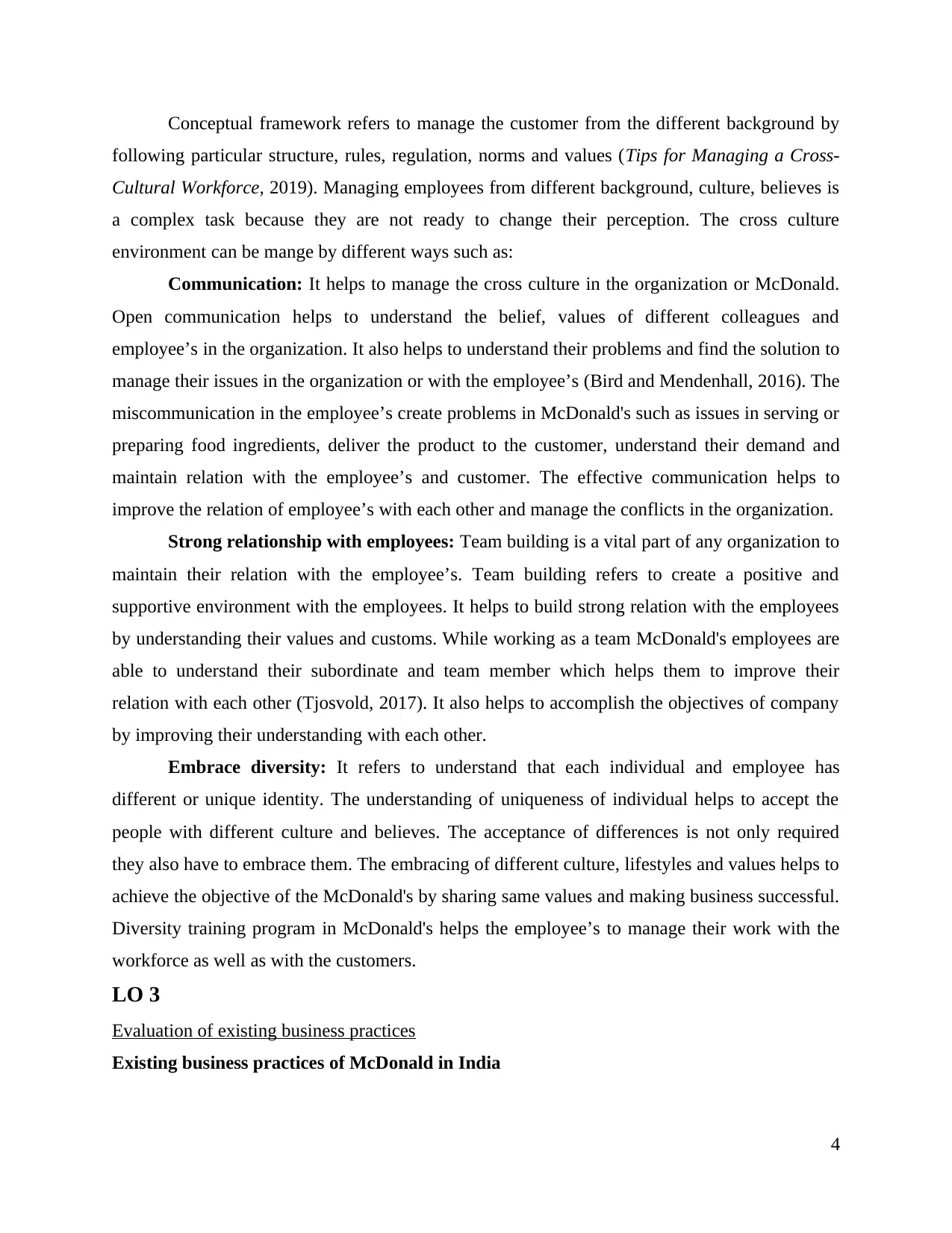
Conceptual framework refers to manage the customer from the different background by
following particular structure, rules, regulation, norms and values (Tips for Managing a Cross-
Cultural Workforce, 2019). Managing employees from different background, culture, believes is
a complex task because they are not ready to change their perception. The cross culture
environment can be mange by different ways such as:
Communication: It helps to manage the cross culture in the organization or McDonald.
Open communication helps to understand the belief, values of different colleagues and
employee’s in the organization. It also helps to understand their problems and find the solution to
manage their issues in the organization or with the employee’s (Bird and Mendenhall, 2016). The
miscommunication in the employee’s create problems in McDonald's such as issues in serving or
preparing food ingredients, deliver the product to the customer, understand their demand and
maintain relation with the employee’s and customer. The effective communication helps to
improve the relation of employee’s with each other and manage the conflicts in the organization.
Strong relationship with employees: Team building is a vital part of any organization to
maintain their relation with the employee’s. Team building refers to create a positive and
supportive environment with the employees. It helps to build strong relation with the employees
by understanding their values and customs. While working as a team McDonald's employees are
able to understand their subordinate and team member which helps them to improve their
relation with each other (Tjosvold, 2017). It also helps to accomplish the objectives of company
by improving their understanding with each other.
Embrace diversity: It refers to understand that each individual and employee has
different or unique identity. The understanding of uniqueness of individual helps to accept the
people with different culture and believes. The acceptance of differences is not only required
they also have to embrace them. The embracing of different culture, lifestyles and values helps to
achieve the objective of the McDonald's by sharing same values and making business successful.
Diversity training program in McDonald's helps the employee’s to manage their work with the
workforce as well as with the customers.
LO 3
Evaluation of existing business practices
Existing business practices of McDonald in India
4
following particular structure, rules, regulation, norms and values (Tips for Managing a Cross-
Cultural Workforce, 2019). Managing employees from different background, culture, believes is
a complex task because they are not ready to change their perception. The cross culture
environment can be mange by different ways such as:
Communication: It helps to manage the cross culture in the organization or McDonald.
Open communication helps to understand the belief, values of different colleagues and
employee’s in the organization. It also helps to understand their problems and find the solution to
manage their issues in the organization or with the employee’s (Bird and Mendenhall, 2016). The
miscommunication in the employee’s create problems in McDonald's such as issues in serving or
preparing food ingredients, deliver the product to the customer, understand their demand and
maintain relation with the employee’s and customer. The effective communication helps to
improve the relation of employee’s with each other and manage the conflicts in the organization.
Strong relationship with employees: Team building is a vital part of any organization to
maintain their relation with the employee’s. Team building refers to create a positive and
supportive environment with the employees. It helps to build strong relation with the employees
by understanding their values and customs. While working as a team McDonald's employees are
able to understand their subordinate and team member which helps them to improve their
relation with each other (Tjosvold, 2017). It also helps to accomplish the objectives of company
by improving their understanding with each other.
Embrace diversity: It refers to understand that each individual and employee has
different or unique identity. The understanding of uniqueness of individual helps to accept the
people with different culture and believes. The acceptance of differences is not only required
they also have to embrace them. The embracing of different culture, lifestyles and values helps to
achieve the objective of the McDonald's by sharing same values and making business successful.
Diversity training program in McDonald's helps the employee’s to manage their work with the
workforce as well as with the customers.
LO 3
Evaluation of existing business practices
Existing business practices of McDonald in India
4
⊘ This is a preview!⊘
Do you want full access?
Subscribe today to unlock all pages.

Trusted by 1+ million students worldwide
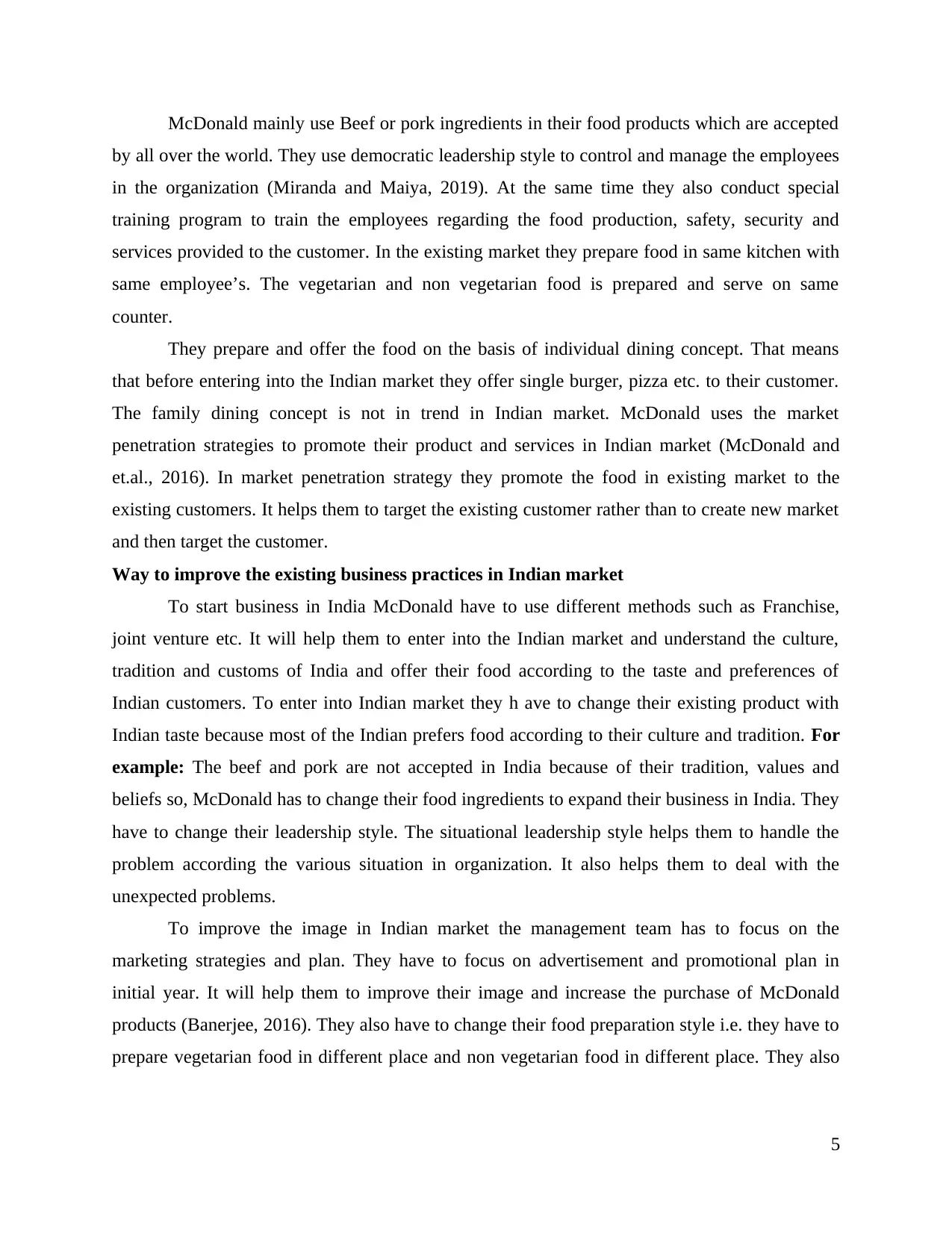
McDonald mainly use Beef or pork ingredients in their food products which are accepted
by all over the world. They use democratic leadership style to control and manage the employees
in the organization (Miranda and Maiya, 2019). At the same time they also conduct special
training program to train the employees regarding the food production, safety, security and
services provided to the customer. In the existing market they prepare food in same kitchen with
same employee’s. The vegetarian and non vegetarian food is prepared and serve on same
counter.
They prepare and offer the food on the basis of individual dining concept. That means
that before entering into the Indian market they offer single burger, pizza etc. to their customer.
The family dining concept is not in trend in Indian market. McDonald uses the market
penetration strategies to promote their product and services in Indian market (McDonald and
et.al., 2016). In market penetration strategy they promote the food in existing market to the
existing customers. It helps them to target the existing customer rather than to create new market
and then target the customer.
Way to improve the existing business practices in Indian market
To start business in India McDonald have to use different methods such as Franchise,
joint venture etc. It will help them to enter into the Indian market and understand the culture,
tradition and customs of India and offer their food according to the taste and preferences of
Indian customers. To enter into Indian market they h ave to change their existing product with
Indian taste because most of the Indian prefers food according to their culture and tradition. For
example: The beef and pork are not accepted in India because of their tradition, values and
beliefs so, McDonald has to change their food ingredients to expand their business in India. They
have to change their leadership style. The situational leadership style helps them to handle the
problem according the various situation in organization. It also helps them to deal with the
unexpected problems.
To improve the image in Indian market the management team has to focus on the
marketing strategies and plan. They have to focus on advertisement and promotional plan in
initial year. It will help them to improve their image and increase the purchase of McDonald
products (Banerjee, 2016). They also have to change their food preparation style i.e. they have to
prepare vegetarian food in different place and non vegetarian food in different place. They also
5
by all over the world. They use democratic leadership style to control and manage the employees
in the organization (Miranda and Maiya, 2019). At the same time they also conduct special
training program to train the employees regarding the food production, safety, security and
services provided to the customer. In the existing market they prepare food in same kitchen with
same employee’s. The vegetarian and non vegetarian food is prepared and serve on same
counter.
They prepare and offer the food on the basis of individual dining concept. That means
that before entering into the Indian market they offer single burger, pizza etc. to their customer.
The family dining concept is not in trend in Indian market. McDonald uses the market
penetration strategies to promote their product and services in Indian market (McDonald and
et.al., 2016). In market penetration strategy they promote the food in existing market to the
existing customers. It helps them to target the existing customer rather than to create new market
and then target the customer.
Way to improve the existing business practices in Indian market
To start business in India McDonald have to use different methods such as Franchise,
joint venture etc. It will help them to enter into the Indian market and understand the culture,
tradition and customs of India and offer their food according to the taste and preferences of
Indian customers. To enter into Indian market they h ave to change their existing product with
Indian taste because most of the Indian prefers food according to their culture and tradition. For
example: The beef and pork are not accepted in India because of their tradition, values and
beliefs so, McDonald has to change their food ingredients to expand their business in India. They
have to change their leadership style. The situational leadership style helps them to handle the
problem according the various situation in organization. It also helps them to deal with the
unexpected problems.
To improve the image in Indian market the management team has to focus on the
marketing strategies and plan. They have to focus on advertisement and promotional plan in
initial year. It will help them to improve their image and increase the purchase of McDonald
products (Banerjee, 2016). They also have to change their food preparation style i.e. they have to
prepare vegetarian food in different place and non vegetarian food in different place. They also
5
Paraphrase This Document
Need a fresh take? Get an instant paraphrase of this document with our AI Paraphraser
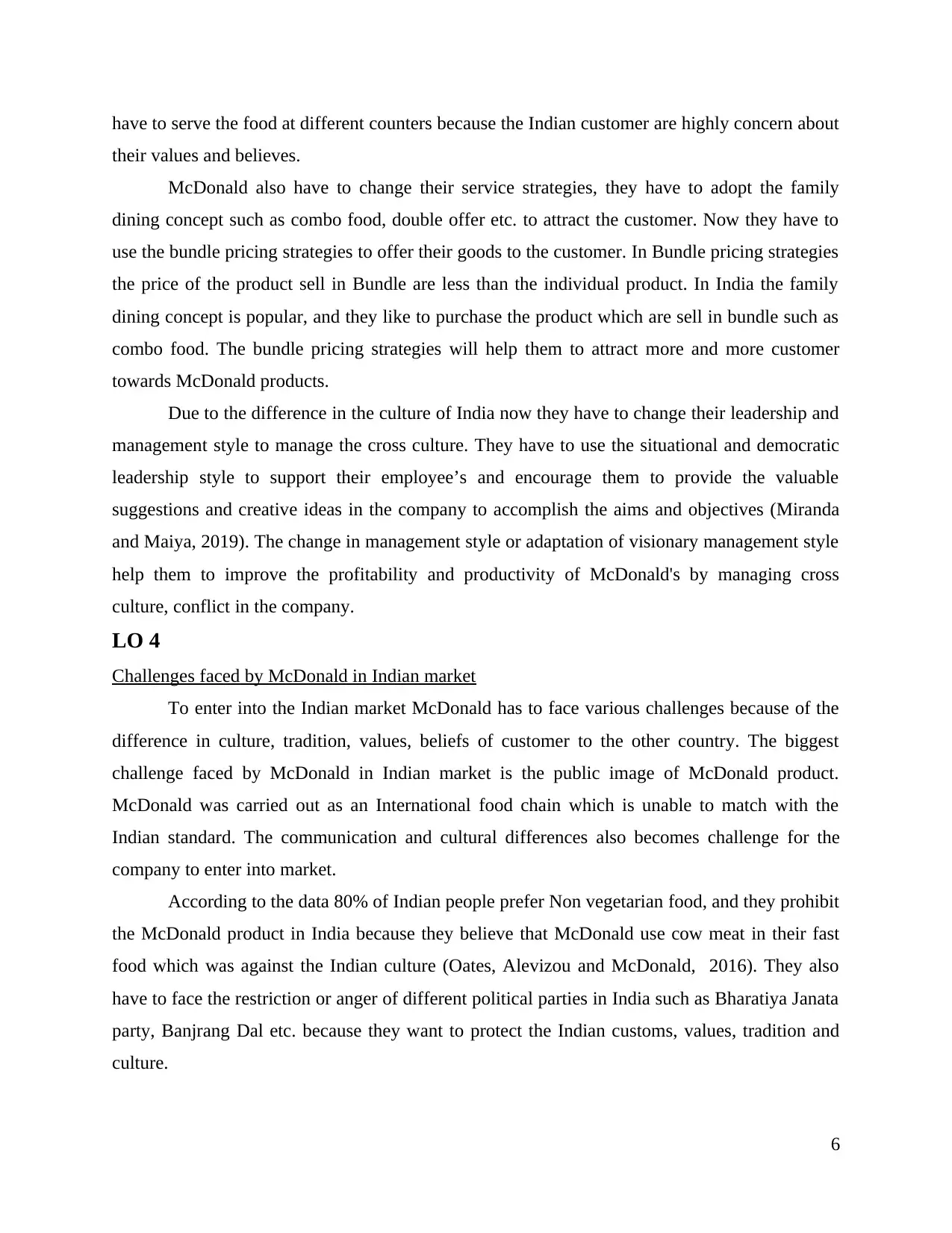
have to serve the food at different counters because the Indian customer are highly concern about
their values and believes.
McDonald also have to change their service strategies, they have to adopt the family
dining concept such as combo food, double offer etc. to attract the customer. Now they have to
use the bundle pricing strategies to offer their goods to the customer. In Bundle pricing strategies
the price of the product sell in Bundle are less than the individual product. In India the family
dining concept is popular, and they like to purchase the product which are sell in bundle such as
combo food. The bundle pricing strategies will help them to attract more and more customer
towards McDonald products.
Due to the difference in the culture of India now they have to change their leadership and
management style to manage the cross culture. They have to use the situational and democratic
leadership style to support their employee’s and encourage them to provide the valuable
suggestions and creative ideas in the company to accomplish the aims and objectives (Miranda
and Maiya, 2019). The change in management style or adaptation of visionary management style
help them to improve the profitability and productivity of McDonald's by managing cross
culture, conflict in the company.
LO 4
Challenges faced by McDonald in Indian market
To enter into the Indian market McDonald has to face various challenges because of the
difference in culture, tradition, values, beliefs of customer to the other country. The biggest
challenge faced by McDonald in Indian market is the public image of McDonald product.
McDonald was carried out as an International food chain which is unable to match with the
Indian standard. The communication and cultural differences also becomes challenge for the
company to enter into market.
According to the data 80% of Indian people prefer Non vegetarian food, and they prohibit
the McDonald product in India because they believe that McDonald use cow meat in their fast
food which was against the Indian culture (Oates, Alevizou and McDonald, 2016). They also
have to face the restriction or anger of different political parties in India such as Bharatiya Janata
party, Banjrang Dal etc. because they want to protect the Indian customs, values, tradition and
culture.
6
their values and believes.
McDonald also have to change their service strategies, they have to adopt the family
dining concept such as combo food, double offer etc. to attract the customer. Now they have to
use the bundle pricing strategies to offer their goods to the customer. In Bundle pricing strategies
the price of the product sell in Bundle are less than the individual product. In India the family
dining concept is popular, and they like to purchase the product which are sell in bundle such as
combo food. The bundle pricing strategies will help them to attract more and more customer
towards McDonald products.
Due to the difference in the culture of India now they have to change their leadership and
management style to manage the cross culture. They have to use the situational and democratic
leadership style to support their employee’s and encourage them to provide the valuable
suggestions and creative ideas in the company to accomplish the aims and objectives (Miranda
and Maiya, 2019). The change in management style or adaptation of visionary management style
help them to improve the profitability and productivity of McDonald's by managing cross
culture, conflict in the company.
LO 4
Challenges faced by McDonald in Indian market
To enter into the Indian market McDonald has to face various challenges because of the
difference in culture, tradition, values, beliefs of customer to the other country. The biggest
challenge faced by McDonald in Indian market is the public image of McDonald product.
McDonald was carried out as an International food chain which is unable to match with the
Indian standard. The communication and cultural differences also becomes challenge for the
company to enter into market.
According to the data 80% of Indian people prefer Non vegetarian food, and they prohibit
the McDonald product in India because they believe that McDonald use cow meat in their fast
food which was against the Indian culture (Oates, Alevizou and McDonald, 2016). They also
have to face the restriction or anger of different political parties in India such as Bharatiya Janata
party, Banjrang Dal etc. because they want to protect the Indian customs, values, tradition and
culture.
6
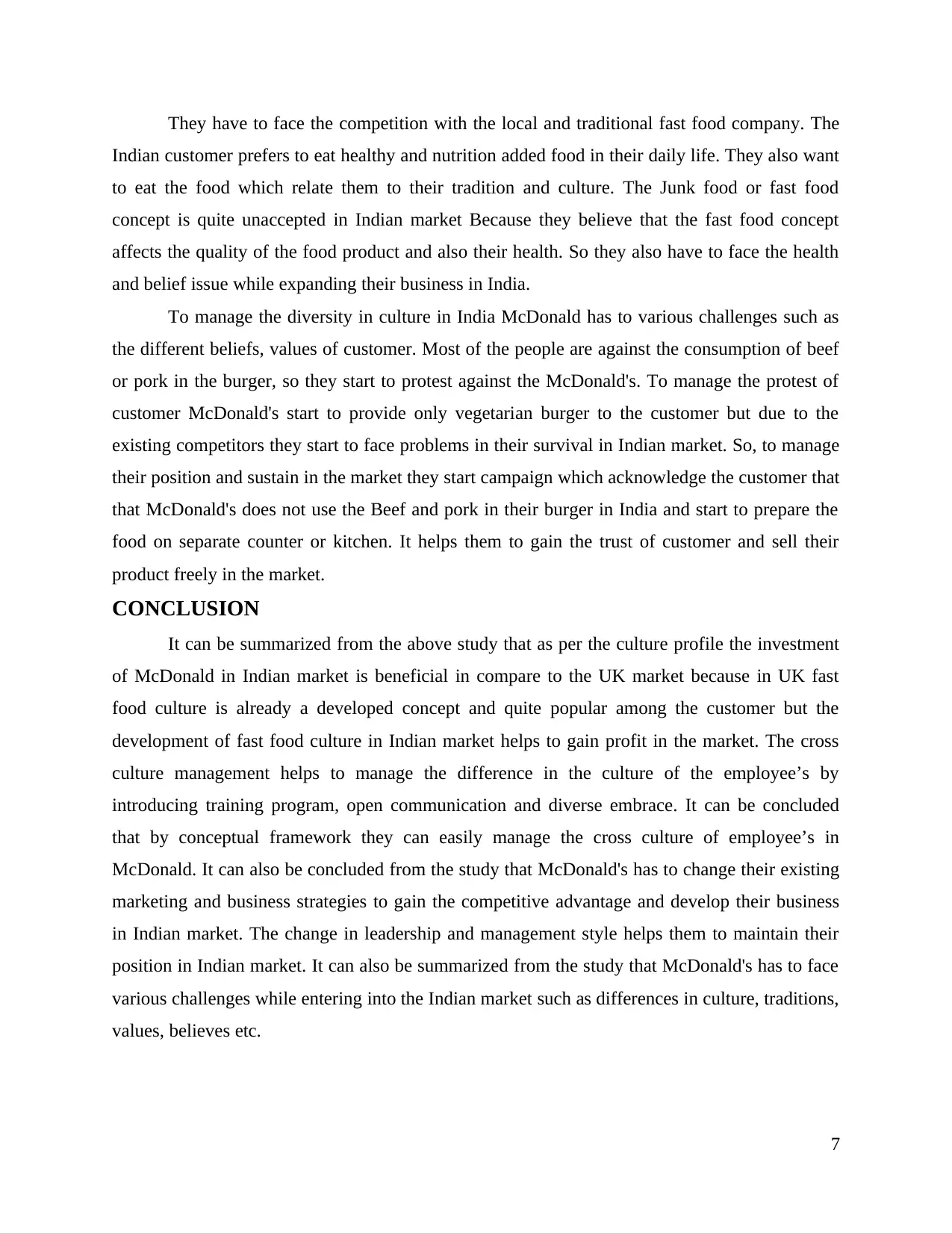
They have to face the competition with the local and traditional fast food company. The
Indian customer prefers to eat healthy and nutrition added food in their daily life. They also want
to eat the food which relate them to their tradition and culture. The Junk food or fast food
concept is quite unaccepted in Indian market Because they believe that the fast food concept
affects the quality of the food product and also their health. So they also have to face the health
and belief issue while expanding their business in India.
To manage the diversity in culture in India McDonald has to various challenges such as
the different beliefs, values of customer. Most of the people are against the consumption of beef
or pork in the burger, so they start to protest against the McDonald's. To manage the protest of
customer McDonald's start to provide only vegetarian burger to the customer but due to the
existing competitors they start to face problems in their survival in Indian market. So, to manage
their position and sustain in the market they start campaign which acknowledge the customer that
that McDonald's does not use the Beef and pork in their burger in India and start to prepare the
food on separate counter or kitchen. It helps them to gain the trust of customer and sell their
product freely in the market.
CONCLUSION
It can be summarized from the above study that as per the culture profile the investment
of McDonald in Indian market is beneficial in compare to the UK market because in UK fast
food culture is already a developed concept and quite popular among the customer but the
development of fast food culture in Indian market helps to gain profit in the market. The cross
culture management helps to manage the difference in the culture of the employee’s by
introducing training program, open communication and diverse embrace. It can be concluded
that by conceptual framework they can easily manage the cross culture of employee’s in
McDonald. It can also be concluded from the study that McDonald's has to change their existing
marketing and business strategies to gain the competitive advantage and develop their business
in Indian market. The change in leadership and management style helps them to maintain their
position in Indian market. It can also be summarized from the study that McDonald's has to face
various challenges while entering into the Indian market such as differences in culture, traditions,
values, believes etc.
7
Indian customer prefers to eat healthy and nutrition added food in their daily life. They also want
to eat the food which relate them to their tradition and culture. The Junk food or fast food
concept is quite unaccepted in Indian market Because they believe that the fast food concept
affects the quality of the food product and also their health. So they also have to face the health
and belief issue while expanding their business in India.
To manage the diversity in culture in India McDonald has to various challenges such as
the different beliefs, values of customer. Most of the people are against the consumption of beef
or pork in the burger, so they start to protest against the McDonald's. To manage the protest of
customer McDonald's start to provide only vegetarian burger to the customer but due to the
existing competitors they start to face problems in their survival in Indian market. So, to manage
their position and sustain in the market they start campaign which acknowledge the customer that
that McDonald's does not use the Beef and pork in their burger in India and start to prepare the
food on separate counter or kitchen. It helps them to gain the trust of customer and sell their
product freely in the market.
CONCLUSION
It can be summarized from the above study that as per the culture profile the investment
of McDonald in Indian market is beneficial in compare to the UK market because in UK fast
food culture is already a developed concept and quite popular among the customer but the
development of fast food culture in Indian market helps to gain profit in the market. The cross
culture management helps to manage the difference in the culture of the employee’s by
introducing training program, open communication and diverse embrace. It can be concluded
that by conceptual framework they can easily manage the cross culture of employee’s in
McDonald. It can also be concluded from the study that McDonald's has to change their existing
marketing and business strategies to gain the competitive advantage and develop their business
in Indian market. The change in leadership and management style helps them to maintain their
position in Indian market. It can also be summarized from the study that McDonald's has to face
various challenges while entering into the Indian market such as differences in culture, traditions,
values, believes etc.
7
⊘ This is a preview!⊘
Do you want full access?
Subscribe today to unlock all pages.

Trusted by 1+ million students worldwide

8
Paraphrase This Document
Need a fresh take? Get an instant paraphrase of this document with our AI Paraphraser
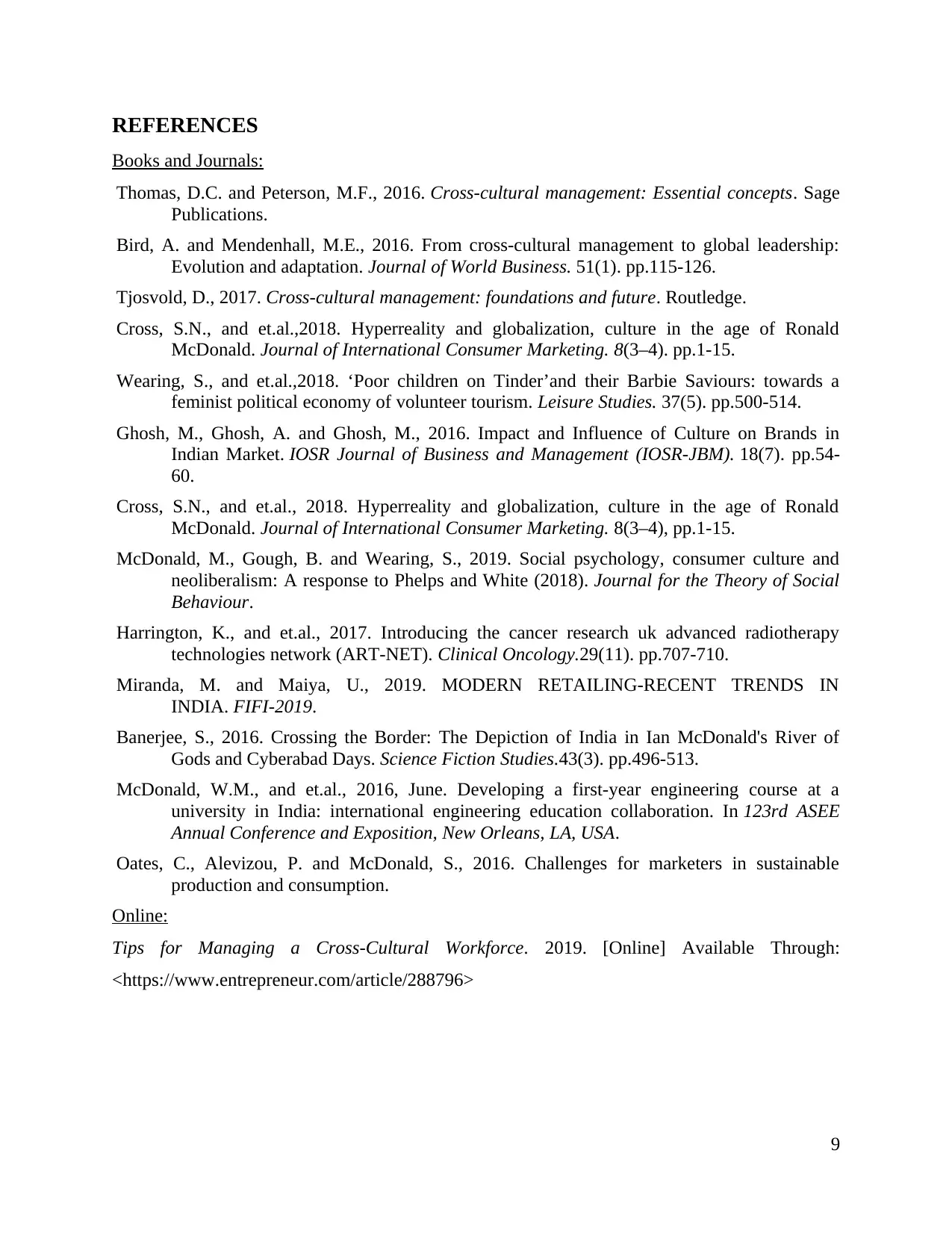
REFERENCES
Books and Journals:
Thomas, D.C. and Peterson, M.F., 2016. Cross-cultural management: Essential concepts. Sage
Publications.
Bird, A. and Mendenhall, M.E., 2016. From cross-cultural management to global leadership:
Evolution and adaptation. Journal of World Business. 51(1). pp.115-126.
Tjosvold, D., 2017. Cross-cultural management: foundations and future. Routledge.
Cross, S.N., and et.al.,2018. Hyperreality and globalization, culture in the age of Ronald
McDonald. Journal of International Consumer Marketing. 8(3–4). pp.1-15.
Wearing, S., and et.al.,2018. ‘Poor children on Tinder’and their Barbie Saviours: towards a
feminist political economy of volunteer tourism. Leisure Studies. 37(5). pp.500-514.
Ghosh, M., Ghosh, A. and Ghosh, M., 2016. Impact and Influence of Culture on Brands in
Indian Market. IOSR Journal of Business and Management (IOSR-JBM). 18(7). pp.54-
60.
Cross, S.N., and et.al., 2018. Hyperreality and globalization, culture in the age of Ronald
McDonald. Journal of International Consumer Marketing. 8(3–4), pp.1-15.
McDonald, M., Gough, B. and Wearing, S., 2019. Social psychology, consumer culture and
neoliberalism: A response to Phelps and White (2018). Journal for the Theory of Social
Behaviour.
Harrington, K., and et.al., 2017. Introducing the cancer research uk advanced radiotherapy
technologies network (ART-NET). Clinical Oncology.29(11). pp.707-710.
Miranda, M. and Maiya, U., 2019. MODERN RETAILING-RECENT TRENDS IN
INDIA. FIFI-2019.
Banerjee, S., 2016. Crossing the Border: The Depiction of India in Ian McDonald's River of
Gods and Cyberabad Days. Science Fiction Studies.43(3). pp.496-513.
McDonald, W.M., and et.al., 2016, June. Developing a first-year engineering course at a
university in India: international engineering education collaboration. In 123rd ASEE
Annual Conference and Exposition, New Orleans, LA, USA.
Oates, C., Alevizou, P. and McDonald, S., 2016. Challenges for marketers in sustainable
production and consumption.
Online:
Tips for Managing a Cross-Cultural Workforce. 2019. [Online] Available Through:
<https://www.entrepreneur.com/article/288796>
9
Books and Journals:
Thomas, D.C. and Peterson, M.F., 2016. Cross-cultural management: Essential concepts. Sage
Publications.
Bird, A. and Mendenhall, M.E., 2016. From cross-cultural management to global leadership:
Evolution and adaptation. Journal of World Business. 51(1). pp.115-126.
Tjosvold, D., 2017. Cross-cultural management: foundations and future. Routledge.
Cross, S.N., and et.al.,2018. Hyperreality and globalization, culture in the age of Ronald
McDonald. Journal of International Consumer Marketing. 8(3–4). pp.1-15.
Wearing, S., and et.al.,2018. ‘Poor children on Tinder’and their Barbie Saviours: towards a
feminist political economy of volunteer tourism. Leisure Studies. 37(5). pp.500-514.
Ghosh, M., Ghosh, A. and Ghosh, M., 2016. Impact and Influence of Culture on Brands in
Indian Market. IOSR Journal of Business and Management (IOSR-JBM). 18(7). pp.54-
60.
Cross, S.N., and et.al., 2018. Hyperreality and globalization, culture in the age of Ronald
McDonald. Journal of International Consumer Marketing. 8(3–4), pp.1-15.
McDonald, M., Gough, B. and Wearing, S., 2019. Social psychology, consumer culture and
neoliberalism: A response to Phelps and White (2018). Journal for the Theory of Social
Behaviour.
Harrington, K., and et.al., 2017. Introducing the cancer research uk advanced radiotherapy
technologies network (ART-NET). Clinical Oncology.29(11). pp.707-710.
Miranda, M. and Maiya, U., 2019. MODERN RETAILING-RECENT TRENDS IN
INDIA. FIFI-2019.
Banerjee, S., 2016. Crossing the Border: The Depiction of India in Ian McDonald's River of
Gods and Cyberabad Days. Science Fiction Studies.43(3). pp.496-513.
McDonald, W.M., and et.al., 2016, June. Developing a first-year engineering course at a
university in India: international engineering education collaboration. In 123rd ASEE
Annual Conference and Exposition, New Orleans, LA, USA.
Oates, C., Alevizou, P. and McDonald, S., 2016. Challenges for marketers in sustainable
production and consumption.
Online:
Tips for Managing a Cross-Cultural Workforce. 2019. [Online] Available Through:
<https://www.entrepreneur.com/article/288796>
9
1 out of 11
Related Documents
Your All-in-One AI-Powered Toolkit for Academic Success.
+13062052269
info@desklib.com
Available 24*7 on WhatsApp / Email
![[object Object]](/_next/static/media/star-bottom.7253800d.svg)
Unlock your academic potential
Copyright © 2020–2026 A2Z Services. All Rights Reserved. Developed and managed by ZUCOL.



